HumanTech Meetings: Współczesne technologie a stare i nowe ludzkie zmysły

Człowiek poznaje świat za pomocą zmysłów. Bywa, że nowe technologie ograniczają nam doświadczenia sensoryczne, np. zamiast bezpośrednio czuć wszystkimi zmysłami bycie wśród natury, mamy z nią „kontakt” jedynie przez ekran telewizora albo smartfona. Co ciekawe, współczesne technologie mogą poszerzać nasze doznania zmysłowe, pozwalając zobaczyć czy usłyszeć coś, czego wcześniej nie moglibyśmy doświadczyć, np. grając w gry wideo czy w immersji VR.
Co więcej, najnowsze rozwiązania technologiczne oraz coraz większa wiedza o ludzkim mózgu pozwalają pomóc tym, których zmysły uległy uszkodzeniu czy degeneracji, np. osobom niesłyszącym czy niewidomym. Technologia może zatem umożliwić im poczucie otaczającego ich świata.
Te zagadnienia poruszą goście kolejnego spotkania z serii HumanTech Meetings: prof. David Eagelman z Uniwersytetu Stanforda, znany na całym świecie neuronaukowiec, autor wielu książek na temat mózgu, oraz prof. Piotr Winkielman z Uniwersytetu Kalifornijskiego w San Diego (pracuje również na Uniwersytecie SWPS), jeden z najwybitniejszych polskich naukowców badających zależności między poznaniem społecznym, emocjami, ucieleśnieniem i świadomością.
„HumanTech Meetings” – zadanie finansowane w ramach umowy 792/P-DUN/2019 ze środków Ministra Nauki i Szkolnictwa Wyższego przeznaczonych na działalność upowszechniającą naukę.
Prelekcje odbędą się w języku polskim oraz angielskim i będą tłumaczone.
Formuła spotkania
Żyjemy w czasach postępu technologicznego i dynamicznego rozwoju cyfryzacji. Współczesny pęd do tworzenia nowoczesnych rozwiązań może powodować trudne do przewidzenia skutki psychologiczne i społeczne. Dlatego tak ważne jest nawiązywanie współpracy między inżynierami, programistami, specjalistami IT oraz przedstawicielami nauk społecznych już na wstępnym etapie opracowywania nowej technologii lub usługi. To nie tylko daje szansę na uniknięcie błędów, lecz także umożliwia rozwinięcie innowacyjnego pomysłu.
Projekt HumanTech Meetings to seria spotkań skupiających naukowców i specjalistów z branży technologicznej z Polski i innych krajów. Każde spotkanie składa się z dwóch wykładów, jednego wygłoszonego przez eksperta z Polski i jednego wygłoszonego przez specjalistę z innego kraju. Po wykładach organizujemy dyskusje panelowe, podczas których zaproszeni goście przedstawiają różne podejścia do innowacji i technologii. Spotkania organizowane są przez Centrum Innowacji Społecznych i Technologicznych HumanTech Uniwersytetu SWPS.
Sądzę, że w dobie koronawirusa szczególnie dostrzegamy wagę naszych zmysłów – gdyż co chwilę dowiadujemy się, że ktoś zachorował i utracił węch i smak. Ale to są problemy przejściowe; niektórzy od urodzenia albo w wyników różnych schorzeń nie słyszą czy nie widzą. Najnowsze technologie mogą pomóc niepełnosprawnym na nowo cieszyć się kolorami czy dźwiękami. To jest jeden z niewielu obszarów nowych technologii, w jakich dylematy etyczne w zasadzie nie istnieją.
dr Konrad Maj, kierownik Centrum Innowacji Społecznych i Technologicznych HumanTech, Uniwersytet SWPS
Wystąpienia
Lecture 1: CREATING NEW SENSES FOR HUMANS – DAVID EAGLEMAN (STANFORD UNIVERSITY, USA)
What would the world be like if we could expand our senses beyond the capacities that we come to the table with? To explore this possibility, we feed sensory signals into the brain through atypical sensory pathways. For example, we can address the limitations of deafness by turning auditory information into a series of vibrating patterns on the skin. This is done via Buzz, a small wristband with vibratory motors in the band. But Buzz isn’t only for hearing loss: we’re using it to feed in all kinds of information streams, from infrared to olfactory information to the stock market. Using this approach of sensory substitution, we can translate and feed almost any kind of data through the skin – thus expanding the human sensory experience.

prof. David Eagleman – is a neuroscientist at Stanford University, an internationally bestselling author, and a Guggenheim Fellow. He is the writer and presenter of The Brain, an Emmy-nominated television series on PBS and BBC. Dr. Eagleman’s areas of research include sensory substitution, time perception, vision, and synesthesia; he also studies the intersection of neuroscience with the legal system, and in that capacity he directs the Center for Science and Law. Eagleman is the author of many books, including Livewired, The Runaway Species, The Brain, Incognito, and Wednesday is Indigo Blue. He is also the author of a widely adopted textbook on cognitive neuroscience, Brain and Behavior, as well as a bestselling book of literary fiction, Sum, which has been translated into 32 languages, turned into two operas, and named a Best Book of the Year by Barnes and Noble. Dr. Eagleman writes for the Atlantic, New York Times, Discover Magazine, Slate, Wired, and New Scientist, and appears regularly on National Public Radio and BBC to discuss both science and literature. He has been a TED speaker, a guest on the Colbert Report, and profiled in the New Yorker magazine. He has spun several companies out of his lab, including Neosensory, a company which uses haptics for sensory substitution and addition.
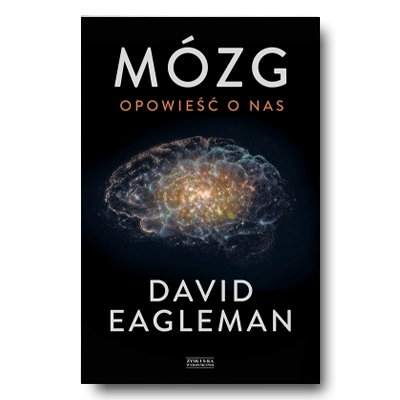 Ukazała się właśnie polska wersja książki prof. Davida Eagelmana Mózg. Opowieść o nas.
Ukazała się właśnie polska wersja książki prof. Davida Eagelmana Mózg. Opowieść o nas.
Lecture 2: SEEING AND DOING FEELINGS: USING TECHNOLOGY TO UNDERSTAND AND IMPROVE EMOTION RECOGNITION AND SOCIAL BEHAVIOR – PIOTR WINKIELMAN (UNIVERSITY OF CALIFORNIA, USA)
How do people understand others – their feelings, intentions, and behaviors? These fundamental questions puzzle psychologists, cognitive scientists, and philosophers. They also are crucial in helping individuals with deficits in emotion and social perception. Professor Winkielman will tell us how technology can offer better insights into the basic mechanisms of social mind and how it can also lead to novel therapeutic interventions.
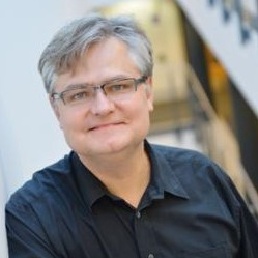
prof. Piotr Winkielman – is professor of psychology at the University of California, San Diego (PhD 1997 Michigan). He also holds an appointment at SWPS University of Social Sciences and Humanities in Warsaw, Poland. His research concerns the relation between social cognition, emotion, embodiment, and consciousness. He explores these topics using psychological and biological approaches. Dr. Winkielman’s research has been supported by grants from NSF, NIMH, and NAAR. He is a fellow of APS and SPSP. He co-edited books Emotion and Consciousness and also Social Neuroscience. He has served on the editorial boards of the Journal of Personality and Social Psychology and Personality and Social Psychology Bulletin. He was associate editor of Emotion, and also of Psychological Review.
Panel Discussion & Panelists
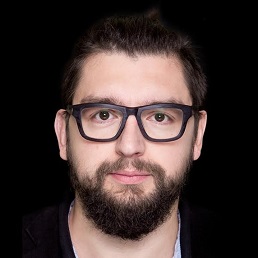
dr hab. Mirosław Filiciak, prof. Uniwersytetu SWPS - Medioznawca. Zajmuje się wpływem mediów cyfrowych na uczestnictwo w kulturze. Bada internet, gry komputerowe, przemiany telewizji oraz nieformalny obieg treści i kulturę współczesną. Na Uniwersytecie SWPS pełni funkcję Dyrekrora Instytutu Nauk Humanistycznych, Dziekana Wydziału Nauk Humanistycznych i Społecznych oraz Kierownik Katedry Kulturoznawstwa.
Od lat współpracuje z publicznymi instytucjami kultury, organizacjami pozarządowymi i biznesem. Jest współtwórcą techno-kulturowego projektu Kultura 2.0, współtworzył też pierwszy polski Medialab – inicjatywę samokształceniową z pogranicza aktywizmu społecznego, sztuki i technologii. Kierował licznymi projektami badawczymi, takimi jak „Młodzi i media” , „Tajni kulturalni” czy „Obiegi kultury”. Autor książek: „Wirtualny plac zabaw. Gry sieciowe i przemiany kultury współczesnej” (2006), „Media, wersja beta” (2014) oraz wspólnie z Alkiem Tarkowskim „Dwa zero. Alfabet nowej kultury i inne teksty” (2015). Zastępca redaktora naczelnego kwartalnika „Kultura Popularna”.
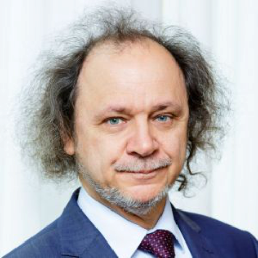
Professor Włodzisław Duch – is the Head of the Neurocognitive Laboratory in the Center of Modern Interdisciplinary Technologies, and the Neuroinformatics and Artificial Intelligence group in the University Centre of Excellence Dynamics, Mathematical Analysis and Artificial Intelligence. He also works at the Department of Informatics at Nicolaus Copernicus University in Toruń, Poland. From 2003 to 2012, Professor Duch was Visiting Professor at the School of Computer Engineering, Nanyang Technological University, in Singapore. He served as the President of the European Neural Networks Society for two terms (2006-2008-2011). In 2013, he was elected to the College of Fellows of the International Neural Networks Society. From 2014 to 2015 he served as the Deputy Minister for Science and Higher Education of Poland, and form 2011 to 2014, he held the post of Vice-President for Research and ICT Infrastructure at Nicolaus Copernicus University in Toruń.
More information: https://www.is.umk.pl/~duch/index.html
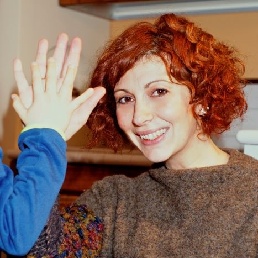
Monica Gori, Ph.D. – is the Principal Investigator of the Unit for Visually Impaired People (U-VIP) of the Italian Institute of Technology (IIT). Her lab comprises 18 researchers (9 psychologists and 9 engineers). Monica Gori is an experimental psychologist with a Ph.D. in Humanoid Technologies. She is an expert on development, multisensory integration, rehabilitation, and visual disability. Her contribution to science is exemplified by 130 international papers, 5 book chapters, and many conference abstracts. Internationally recognized impact and productivity indexes show that her work was cited 2,400 times, which places her in the top 25% of the H-index (ORCID ID orcid.org/0000-0002-5616-865X; Scopus Research ID: 23491803400; ResearcherID: A-1238-2014). She was the scientific coordinator of two large European grants, ABBI (~€2 million) and WeDraw (~€2.5 million). One of her works has been listed in the faculty of 1000 (Gori et al. Curr Biol, 2008). In 2012, she won the TR35 prize for young innovators. In 2020 Monica won an ERC STG with the MYSpace project. The project started in January 2021. https://www.iit.it/it/people/monica-gori
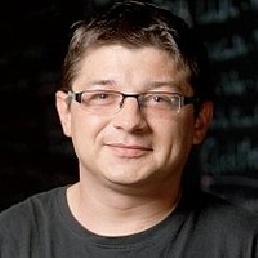
Przemysław Kuśmierek – is an entrepreneur and founder of MIGAM (migam.org), a company facilitating communication between businesses and hearing-impaired clients, which thanks to the Virgin Academy program, attracted an interest and investment of Sir Richard Branson. Mr. Kuśnierek is also a founder of Work Without Barriers (pracabezbarier.eu), and a video contact center platform (ommi.io), enabling effective online communication, sales, and customer service for businesses and clients. In 2016, he won the Polish edition of the Chivas Venture competition promoting socially active businesses. He was also recognized as one of the innovation leaders in the 2014 New Europe 100 ranking organized by Res Publica, the Visegrad Fund, Google, and the Financial Times. In 2013, Mr. Kuśmierek was nominated to the World Summit Awards, a competition organized by the United Nations, and won the prestigious Nominate Trust award that recognizes projects eliminating digital exclusion. He is a graduate of a two-year ELITE Program offered by the London Stock Exchange Group. Professionally, Przemysław Kuśmierek is a Certified Project Manager PRINCE2, PMBOK, as well as CISCO and Microsoft engineer. He is a founding member of the Polish Crowdfunding Society and an active participant in numerous events devoted to innovations in Poland and around the world.
Spotkanie poprowadzi
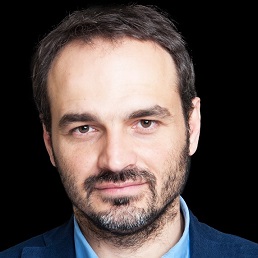
dr Konrad Maj – psycholog społeczny, kierownik projektu HumanTech Meetings, inicjator oraz kierownik Centrum Innowacji Społecznych i Technologicznych „HumanTech”. W pracy naukowej i dydaktycznej koncentruje się na zagadnieniach związanych z wpływem społecznym, psychologią mediów oraz innowacjami. Obecnie prowadzi badania w obszarze HRI (Human-Robot-Interaction). W latach 2013–2016 pełnomocnik prorektora ds. nauki w zakresie komercjalizacji wyników badań naukowych i innowacji społecznych. Odbył szereg wizyt studyjnych w ośrodkach zajmujących się innowacjami ISI – Institute for Social Innovation (Carnegie Mellon University, Pittsburgh, USA), ID+ Research Institute for Design, Media and Culture (University of Averio, Portugalia), Design Factory (Aalto University, Finlandia).
Organizator
Centrum Innowacji Społecznych i Technologicznych HumanTech >>
Główny partner

Partnerzy

Patroni medialni

Sponsor

Termin i miejsce
15 kwietnia 2021 r. (czwartek), godz. 18.00–21.00
online
Kontakt
e-mail: Ten adres pocztowy jest chroniony przed spamowaniem. Aby go zobaczyć, konieczne jest włączenie w przeglądarce obsługi JavaScript.Koordynator: Ewa Łuczak
e-mail: Ten adres pocztowy jest chroniony przed spamowaniem. Aby go zobaczyć, konieczne jest włączenie w przeglądarce obsługi JavaScript.
Projekt (no. 422493) dofinansowany przez Ministerstwo Nauki i Szkolnictwa Wyższego, w ramach „Funduszu Upowszechniania Nauki”.



